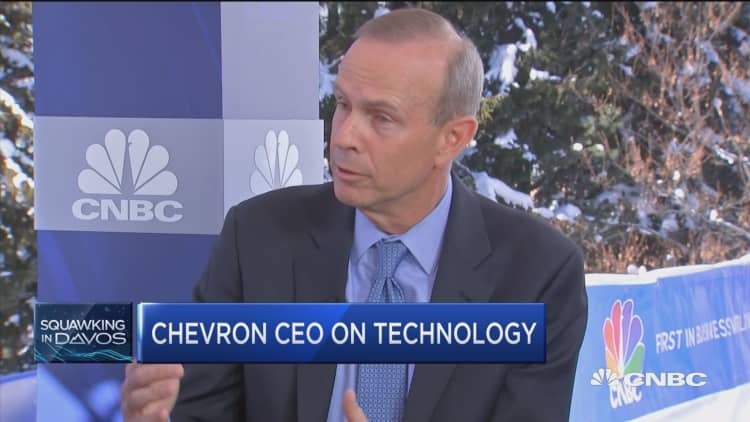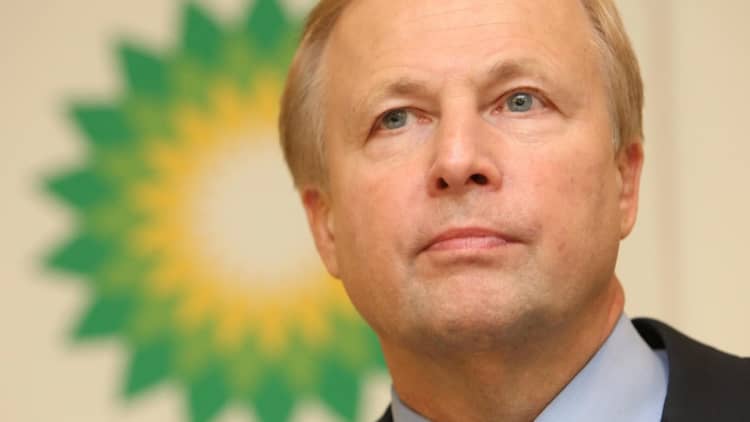President Donald Trump has blasted OPEC several times over the past year, but Hess CEO John Hess says the 14-nation producer group plays an important role in the oil market and deserves praise for stabilizing prices in recent years.
OPEC forged an alliance with Russia and other oil producers in 2016 to end a punishing oil price downturn that bankrupted more than 100 U.S. drillers. The alliance, often called OPEC+, has capped production for much of the last two years in order to shrink a global crude glut and put a floor under oil prices.
"The secretary general of OPEC as well as OPEC members play a very important role in stabilizing markets for oil, so those efforts are to be recognized," Hess said during a panel at the World Economic Forum in Davos, Switzerland on Wednesday.
OPEC Secretary General Mohammed Barkindo, speaking at the same panel, said what OPEC+ has done is "commendable" and helped save U.S. producers.
"We have to continue to collaborate. It's one industry. It's a global industry, and I think our colleagues in the U.S. are on the same page with us and we will work together to exchange views," he said.

Trump does not hold the same view. Beginning last April, he began publicly criticizing OPEC's production caps, accusing the group of keeping oil prices artificially high. Concerned about rising prices at U.S. gas stations, he called on OPEC to pump more oil and slash the cost of crude.
However, Hess cautions that low oil prices have a hidden cost. He says the biggest casualty of the 2014-2016 price slump was investment in future energy supplies.
"The world needs to invest $580 billion a year to keep global oil and gas supply growing with demand" and to offset declining production from existing wells, Hess said.
"Three years ago that number was $350 billion. Two years ago it was $370 billion. Last year, $410 billion, and this year maybe it's 440 — way under what it needs to be to sustain the growth in oil and gas production."
Trump dealt the oil market a 'wild card'
Hess also said OPEC deserves credit for stabilizing the oil market after prices spiked to nearly four-year highs at the start of October, before plunging to 18-month lows in December. Last month, OPEC+ agreed to a fresh round of production cuts in order to put a floor under prices, a move that Trump opposed.
The oil executive said the Trump administration's Iran policy and messaging played a role in the volatility that gripped the oil market at the end of last year.
Trump announced last May that he would restore wide-ranging sanctions on Iran, OPEC's third biggest oil producer at the time. In the following months, his administration repeatedly threatened to cut Iran's exports to zero through strict sanctions.

Concerned about supply shortages, the OPEC+ alliance reversed course in June and started pumping more oil. However, when the sanctions snapped back in November, Washington granted waivers to some of Iran's biggest customers, exacerbating a drop in oil prices that was already under way.
"The Iranian sanctions were the wild card this year," Hess said. "Going into their implementation on Nov. 4 the market was fearful because that's what the U.S. government signaled — that 2.5 million barrels per day of Iranian exports would go to zero. I think a number of producers prepared for that, and then at the last second, the amount of exports cut was actually closer to a million barrels a day."
"So the market before Nov. 4 was panicking to the upside. With the over-correction in supply being put out there, [the market] actually panicked to the downside," Hess said. "And thanks to the efforts of OPEC+, the market is getting re-stabilized now."
'Shale is not the next Saudi Arabia'
With U.S. oil production hitting all-time highs, the United States is now the world's biggest crude producer. However, the nature of U.S. production means American drillers still need OPEC, Hess says.
The surge in U.S. supply is built on shale oil production, which involves using advanced methods to free oil and natural gas from rock formations. Those wells produce a burst of oil at first, but that output soon enters a sharp decline, requiring shale drillers to constantly reinvest in new production.

Shale drillers have also been burning through their most productive wells in recent years, raising concerns that it will become harder to tap the resource at attractive prices in the future.
"I think what people don't realize is shale is about 6 percent of world oil supply now, and it probably will go up to 10 percent by mid-decade. But then it flattens out," Hess said.
"The resource base right now is very healthy, but eventually you get to locations that aren't as attractive as the ones we're drilling right now. So shale is not the next Saudi Arabia."






